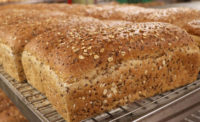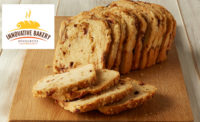Rise Baking Company furthers its reach into the artisan bread market
Rise Baking Company is working to bring a handful of successful regional bakeries to a broader audience.

photos courtesy of Rise Baking Company

photo by Douglas J. Peckenpaugh

photo by Douglas J. Peckenpaugh











When an upstart local bakery does something particularly well, people take notice. Word spreads, the business grows and notoriety develops through the surrounding region.
And that’s when folks in the business of baking really take notice.
New French Bakery first opened for business in Minneapolis during 1995. Over the ensuing two decades, its founder catalyzed significant expansion of the business, eventually capturing a strong percentage of the artisan bakery market in the Twin Cities area and beyond.
Arbor Investments, a food and beverage private equity firm based in Chicago, was on the lookout to acquire an artisan bread brand, and New French Bakery was a perfect fit.
New French is now part of Rise Baking Company, based in Minneapolis. And with the capital Arbor Investments has dedicated to expansion, Rise Baking Company is now ready to further its reach into the burgeoning U.S. artisan bread market.
Supporting growth
“Arbor Investments is the market leader in food and beverage private equity investing,” says Brody Lynn, partner, Arbor Investments, Chicago. “We have $1.5 billion assets under management and exclusively invest in the food and beverage vertical.” Previous baking-related investments include retail take-and-bake pizza pioneer Great Kitchens; one of North America’s leading croissant manufacturers, Gold Standard Baking; and Pita Bread Factory, a premier artisan bakery just outside of Vancouver, British Columbia. The group has acquired 56 companies over the past 22 years. He notes that Arbor employs over 6,000 people across 43 facilities in 21 states.
“Arbor brings a deep Rolodex of internal and external resources in the food and beverage industry, with longstanding relationships with North America’s leading retail and foodservice customers to drive top-line growth, and meaningful experience in brand building, deal sourcing, purchasing, operational improvement and food safety,” says Lynn. “In addition, Arbor makes significant investments in growth capital expenditures and professionalizes organizations by utilizing our internal resources to bolster each company’s HR, IT, legal and finance departments. By engaging in these value-add initiatives early in our investment cycle, we lay the foundation for our companies to capitalize on the numerous growth opportunities present in the market and facilitate their next leap in evolution.”
The companies Arbor has acquired to form Rise Baking Company consist of New French Bakery (artisan bread and rolls), Best Maid Cookie Co. (baked cookies and frozen cookie dough), Hudson Baking Co. (crisp rice bars including marshmallow and peanut butter) and South Coast Baking Co. (frozen cookie dough).
Rise Baking Company’s distribution range covers all of North America, as well as some overseas locations. Its customers span grocery, warehouse/club, convenience and mass merchandisers. The company sells to all of the major foodservice providers.
“Since starting the platform in 2013, Arbor has invested over $27 million in growth capital expenditures to enhance Rise Baking Company’s production capabilities to be able to efficiently deliver high-quality, consistent products from coast to coast,” says Lynn. “Each division has an outstanding regional reputation built by industry-leading customer service, innovation and product quality. Our goal is to keep that midsize company culture that is focused on the customer and bring it to the national stage.” He notes Arbor was also able to leverage its existing customer relationships at large North American retail and foodservice companies to accelerate sales opportunities.
“Arbor is the best private equity investor in the food and beverage space, and the biggest advantage that Arbor gives us from a management standpoint is their experience in the food and beverage industry and willingness to invest significant capital to make high-conviction bets with their portfolio companies,” says Eric Ahlgren, chief operating officer, Rise Baking Company. “It has really been an ideal partnership. They provide the capital and resources to enhance our capabilities in a number of functional areas, which makes it easier to successfully integrate the numerous acquisitions we have made and, ultimately, achieve significant organic growth. That approach to investing is unique in private equity and allows us to focus on what we do best, which is the execution component. We just run the business.”
The pathway that led to the creation of Rise Baking Company has been a “journey to one,” notes Jeff Getzkin, senior vice president of sales, Rise Baking Company. “The sales people are calling up saying that they’re from Best Maid or New French or South Coast, and it gets confusing for customers. Now they can call up and say that they’re from Rise Baking Company.” And the customer now knows that Rise Baking Company means a wide assortment of cookies, crispy bars and bread products.
Getzkin notes that all Rise Baking Company facilities are SQF II or BRC, and all will be BRC by the end of 2017.
Bringing multiple bakery brands—some with decades-long legacies in baking—together under one corporate roof can prove a tricky task. “There was a strong need identified among the teams to connect and create that ‘journey to one,’” says Courtney Wilman, marketing manager, Rise Baking Company. “We have a lot of teams out there selling our products, and our consumers need to recognize who we are.” With multiple brands offered to customers, bringing them all under one umbrella made sense from a cohesion perspective. “This effort has been well received by all of our team members.”
Artisan opportunities
The market for artisan bread continues to expand. The New French Bakery brand historically has a strong focus on retail take-and bake sold in the in-store bakery (ISB), as well as parbaked breads for foodservice customers. Rise Baking Company runs artisan breads at two locations in Minneapolis, with one sporting a brand-new, automated line.
But Rise Baking Company has been careful to stay flexible. “I’ve seen a lot of our competitors over-automate,” says Lynn. “They lose their flexibility. Bakery is not a stagnant program.” Companies often need to deal with a “here today, gone tomorrow” mentality. “It’s important to stay in a hybrid mode, knowing when to automate and when not to.
The new line’s flexibility helps Rise Baking Company offer a wide range of potential products. “We wanted a line that was capable of producing the full breadth of product forms, so when we go into a customer, we can sell anything and everything artisan,” says Ahlgren. “Other benefits include improved throughput, lower scrap and more capacity.”
Mike Schultz, CEO, also notes that line’s capacity for automated scoring helps enable a high level of consistency—as well as unique, potentially differentiating, looks.
As demand for artisan breads increases, so does the desire for diversity. Getzkin notes that the new line will be able to create sharable, pull-apart artisan bread products, as well as greater flexibility in terms of baguette and bun/roll production.
Private label is also part of the business plan. “We have been able to be fairly flexible in how we do retail store brands,” says Getzkin. Rise Baking Company can apply a plain film that can support the retailer’s label to make it their product.
And with the new line, Rise Baking Company can now do the unique shapes that some private label customers seek. “If they don’t want our ciabatta the way it is currently, we can make it a different size or form,” says Getzkin. “For the large-volume opportunities, we’re able to customize.”
The team can also work with the retailers to develop labels. “We have in-house labeling capabilities if they can’t—or don’t want to—do that themselves,” says Getzkin.
A key point of differentiation for Rise Baking Company’s artisan breads is its ability to provide a wide range of flavor profiles. “We don’t have one starter,” says Getzkin. “We have multiple fermentation processes. We’ll use a classic poolish for a baguette, a biga for ciabatta or a levain for sours. Our breads are going to impart different flavors and different tastes. For most people, when they taste it, they’ll be able to tell the difference.”
Clean label and non-GMO are par for the course. “People want clean label, and we’ve always been on that front,” says Getzkin. “That’s helped us grow our artisan bread business.”
Rise Baking Company has been working with new retail customers that have had issues with ISB breads that only offer a one-day shelf life. “Our product will get them four or five days on the shelf, and their shrink goes down dramatically,” says Getzkin. The products then get two more days of shelf life for the consumer at home after purchase. The products have packaging that’s completely sealed, and the breads include natural ingredients that inhibit mold.
“Take-and-bake bread continues to grow,” says Getzkin. “Consumers are looking for fresh product and a better eating experience, and that’s our impetus to continue to grow.”
This freshness component is driving ISB sales at select retailers. “When you go in to the store, the bakery displays and selections scream, ‘We’re a bakery, and we’re in this,’” says Getzkin. “We’re in breads. We’re in cookies. We’re in bars.” He notes a sense of identity needs to drive the ISB. Offering a little bit of everything to appeal to as many shoppers as possible can diminish an ISB’s potential concentrated impact as a destination for a few strong-selling products.
Customer-centric value
Rise Baking Company cannot overemphasize its customer-centered focus.
“We’re an organization focused on customer service,” says Getzkin. “So we’ve looked for companies that culturally fit with that theme.”
Arbor Investments understands the value of meeting this service need. “I think some of the larger baking companies have lost the level of customer focus that you still see with some regional bakers—but the regional bakers don’t have the ability to distribute product on a national basis,” says Lynn. “So it’s hard to partner with them.”
Rise Baking Company saw great potential in the valuable customer service focus that New French, Best Maid, Hudson and South Coast could bring to the company.
“We identified these high-quality, regional bakeries that fit strategically,” says Lynn. “Every company brings something a little bit different to the table. Each acquisition brought a new customer base, a new channel, new capabilities that we can then use to be that one-stop shop offering innovative, high-quality products—and we can provide it on a national basis.”
The convenience store business has changed, and Rise Baking Company offers opportunities to help c-stores grow bakery sales. “They’re baking fresh cookies,” says Getzkin. “They may have their own commissary where they finish off breads for sandwiches. Some even offer take-and-bake products.”
Rise Baking Company also works with retailers to manage their bakery categories. “We work with retailers on their planograms—for the largest ones that want that assistance,” says Getzkin. “We’ll help them understand what their customers need.”
In addition to the sealed film packaging for ISB artisan breads, Rise Baking Company offers a range of clamshells and individually wrapped options for its cookies, including selections that work for warehouse/club stores. “We’re innovative with packaging,” says Wilman. “We’ll figure out a way to provide the solutions retail customers want for their stores.”
This level of flexibility and strong customer service also extends to distribution, with various options to choose from. “A good portion of our business is customer pickup,” says Ahlgren. “We also have relationships with a lot of the national carriers to do delivered business. Also, we run our own trucks for our local fresh bread delivery in the Minneapolis area. It’s really about how we can best service the customer most cost-effectively.”
Getzkin notes that Rise Baking Company representatives regularly sit down with key customers and ask, “What are we doing right? What are we not doing that you want? Where can we put our resources?” It takes time to build new business strategies, and Rise Baking Company wants to make sure that it’s hitting those marks and creating a two-way conversation to grow together.
“It’s a simple concept,” says Lynn, “but a lot of our competitors don’t do that.”
A continued ascent
Continued growth at Rise Baking Company is expected. “We have the opportunity to organically grow Rise Baking Company to over $500 million in sales,” says Schultz. “We will selectively automate where we can to ensure improved product quality, food safety and/or improved costs. We will continue to upgrade equipment on a recurring basis to stay ahead of our competition.”
But in terms of product selection, Rise Baking Company and its partner Arbor Investments think they’ve hit the sweet spot. “I don’t think we’re going to get into new product categories,” says Lynn. “If there are any other acquisitions down the road, it’s going to be pretty much the same thing we’re doing now—cookies, crispy bars and bread—something that’s complementary and easy to add into the system.”
So beyond selectively adding a few efficiencies here and there, the company is settling into a period of growth.
“We want to grow organically,” says Lynn. “This platform has a lot of long-term growth potential.”
Looking for a reprint of this article?
From high-res PDFs to custom plaques, order your copy today!













